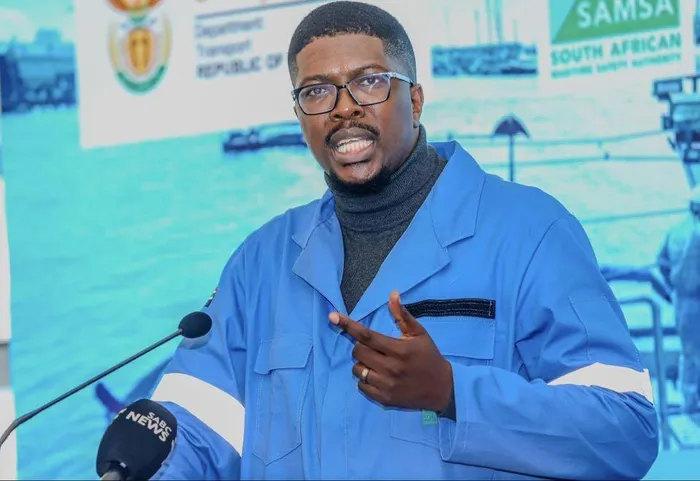
Deputy Transport Minister, Mkhuleko Hlengwa, said that earlier this year, the department directed the South African Maritime Safety Authority (SAMSA) to undertake a comprehensive, nationwide Fishing Vessel Safety Audit.
Image: SAMSA/Supplied
THE tragedy that befell 11 crew members of the 63-year-old vessel, MFV Lepanto when it capsized off Kommetjie last year and the incident involving its sister vessel, Armana, which went up in flames a few months later, were indictments of systems that must be fixed, says Deputy Transport Minister, Mkhuleko Hlengwa.
“These events shook this nation—and rightly so. These are not isolated tragedies. They are warnings. They are calls to action that we can no longer afford to ignore,” Hlengwa said.
He was speaking at a media engagement at the Cape Town Waterfront Jetty on Monday. Hlengwa said that earlier this year, the Department of Transport directed the South African Maritime Safety Authority (SAMSA) to undertake a comprehensive, nationwide audit, which started in Gqeberha and has reached every major fishing port in South Africa.
SAMSA identified three key findings so far, including the age of the fleet, which compromises the structural integrity of the vessels.
The vessels also have stability-related issues, whereby the ships' intake stability under different loading conditions starts to deteriorate, and one of the last findings is the inefficiency of safety management systems.
In his address, Hlengwa said that since 1996, nearly 400 commercial fishing fatalities have been recorded in South Africa, with over half of them occurring in the Western Cape.
“Every life lost at sea is one too many. Every unsafe vessel is a threat not just to a crew, but to the entire social fabric of our coastal communities. Safety is not a privilege for the few. It is a right for all.
“Let us turn this moment into a movement—one that protects life, promotes dignity, and places South Africa at the forefront of maritime safety across the continent,” Hlengwa said.
He said the audit was designed not only to evaluate compliance but to restore accountability, especially where lives were at risk.
“We are focusing on small vessels because the data shows they are the most vulnerable to capsizing, collision, and mechanical failure,” he said.
Principal Audit Officer for SAMSA in Gqeberha, Thandi Mehlo, said that the age of the vessels causes issues of structural integrity as the “steel can only survive a limited period at sea”.
He highlighted challenges with ship repurpose redesigns, which occur without getting their approval, and also how there was a period a few years ago when not one single dry dock, which is used for vessel maintenance and repairs, was operational in the country.
“We had kept continuously granting exceptions to these vessels…and now if you keep doing that, it is going to come back to bite you, and it has come back to bite us," Mehlo said.
“We’re sitting with a couple of these ship repair facilities that are managed by port authorities… and I have evidence to believe that these facilities have since improved, and we are up to date with the management of maintenance.”
Mehlo said that they have a longer goal of a complete 100% audit of the vessels in the next three years, and that their current audit, which only looked at 10% of ships, has taught them valuable lessons that they will use going forward.
Cape Times